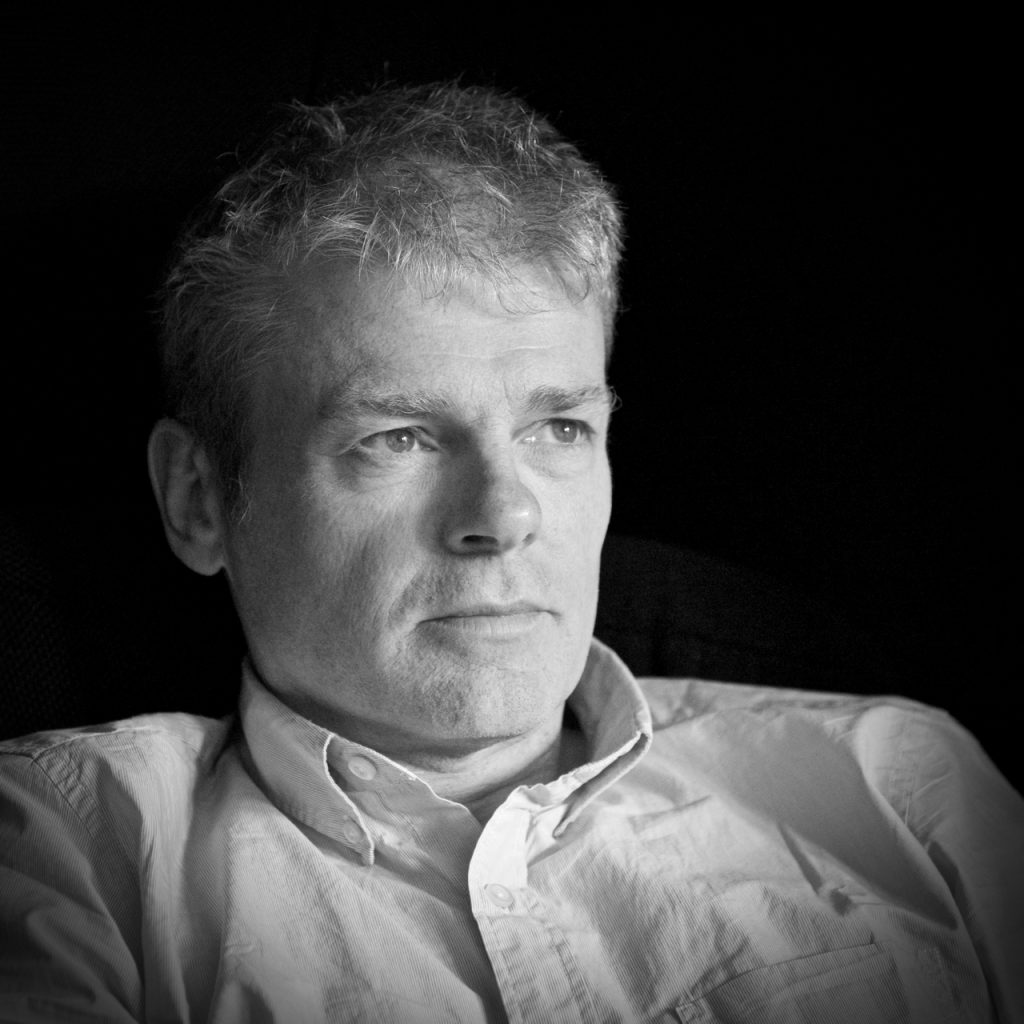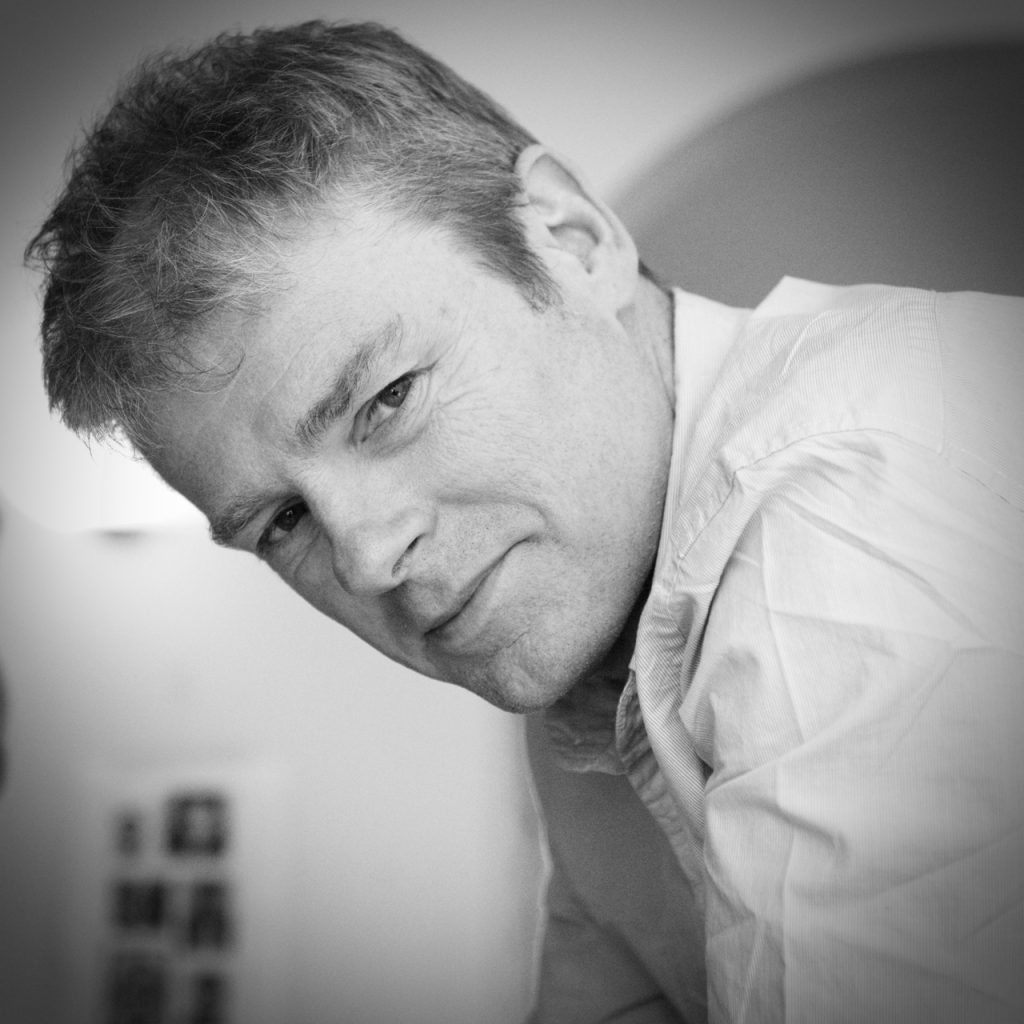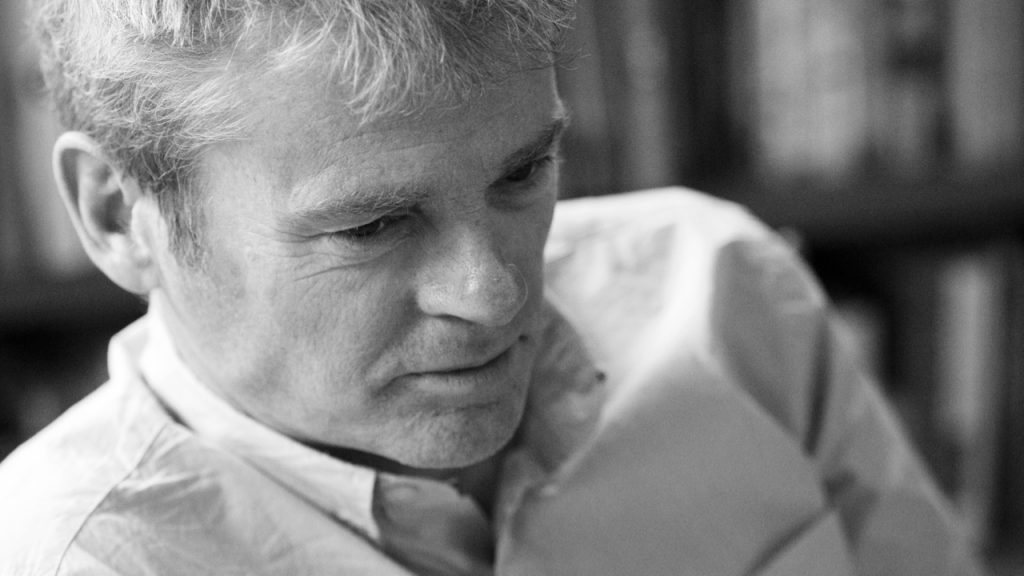Het ging allesbehalve vanzelf, het schrijven van zijn verhalenbundel De pier stort in. Mark Haddon, beroemd geworden met Het wonderbaarlijke voorval met de hond in de nacht, gaan romans een stuk gemakkelijker af. ‘Ik probeer al heel lang korte verhalen te schrijven, en ik wist dat ik ertoe in staat moest zijn, maar het lukte nooit. Het was als een puzzel – ik móést ‘m oplossen.’
Dog Towers
De Britse schrijver Mark Haddon (1962) was al succesvol als kinderboeken- en scenarioschrijver toen hij in 2003 in één klap wereldwijd bekend werd met zijn roman Het wonderbaarlijke voorval met de hond in de nacht. Het tragikomische boek, met een autistische ik-verteller, werd vertaald in veertig talen, won zeventien literaire prijzen en vond zijn weg naar tien miljoen (!) lezers. Daarnaast werd het bewerkt tot een eveneens succesvol en veelbekroond toneelstuk, dat al sinds 2012 te zien is in Londen. Een megasucces dus, waar Haddon onder meer zijn mooie huis in Oxford aan te danken heeft, dat hij met gevoel voor humor Dog Towers heeft genoemd. ‘Ik ben er heel dankbaar voor, al zou ik het helemaal niet erg vinden om het een jaartje of tien even níét meer over dat boek te hebben.’
Het succes bracht hem weliswaar vrijheid, maar niet veel gemoedsrust, vertelt hij in zijn lichte atelier, dat vol staat met portretten en andere kunstwerken – want als Haddon niet schrijft, tekent en schildert hij. ‘Schrijven is voor mij hetzelfde als eten, ademen of hardlopen – het is onderdeel van wie ik ben. Als ik niet schrijf of kunst maak, voel ik me als een hond die niet wordt uitgelaten.’
Worsteling
In de kamer liggen twee hoge stapels exemplaren van The Pier Falls and other stories. De ene is een toren van mooie gebonden exemplaren voor Amazon.com, de ander een stapel met de speciale, door Haddon zelf geïllustreerde uitgave voor de boekhandels, zodat niet íédereen alleen maar op internet koopt. Haddon leunt tevreden achterover in zijn leesstoel, tegen een kussen met eenzelfde gestreepte cover als de special edition. De pier stort in is zijn eerste verhalenbundel.
De kans dat het een bestseller wordt is klein – de romans Een akkefietje en Het rode huis evenaarden ook niet het succes van Het wonderbaarlijke voorval –, maar in Engeland, Amerika en andere landen waar de bundel is verschenen, zijn de recensies wel heel positief. Een paar verhalen uit de bundel zijn zelfs bekroond met een prijs. Een mooi slot van een worstelig schrijftraject, vertelt Haddon. ‘Ik probeer al heel lang korte verhalen te schrijven, en ik wist dat ik ertoe in staat moest zijn, maar het lukte nooit. Het was als een puzzel – ik móést ‘m oplossen.’
Waarom hij per se verhalen wilde schrijven? Haddon trekt een wenkbrauw op. ‘Waarschijnlijk omdat ik moeite had met een nieuwe roman?’ lacht hij. ‘Het enige wat voor mij telt is dat het verhaal wérkt, en als ik daarvoor moet overstappen op een ander genre, dan doe ik dat. Het verhaal “Het eiland” was eerst een lang, verhalend gedicht. Drie andere begonnen als een theaterstuk. Het klopte niet. Uiteindelijk werd duidelijk wat de goede vorm was, maar het was fijn geweest als die verhalen me dat wat eerder hadden ingefluisterd.’
Hard werken
Doorgaans beleeft de Brit niet zo veel plezier aan het schrijven. ‘Het is hard werken. Ik vind geschreven hebben fijner dan het schrijven zelf. Schrijven is alsof je een berg beklimt. Het uitzicht vanaf de top is spectaculair, dat is de beloning, maar het is niet gemakkelijk om daar te komen. Ik kan dingen niet half doen; als het resultaat in mijn ogen niet goed genoeg is, word ik pissig op mezelf. Een groot deel gooi ik weg. Bij mijn verhalenbundel zijn er zeker dertig verhalen gesneuveld. Dat is nu eenmaal mijn werkwijze en ik ben blij met het resultaat, maar efficiënt of prettig is het niet. Steeds als ik ga zitten om te schrijven heb ik meer dan een gemiddelde hoeveelheid zelfvertrouwen nodig om dat te kunnen opbrengen.’
En dat is dus het mooie van korte verhalen, lacht hij: ze zijn kort. ‘Je kunt kunt ze gewoon weggooien als ze niet bevallen, en dat kost je dan niet meteen een jaar van je leven zoals bij een roman. Daardoor kon ik meer risico nemen, meer dingen uitproberen in plot en situering. Zo kon ik het ene verhaal laten spelen in de jungle en een ander op Mars.’
Mededogen met de underdog
In De pier stort in komen dan ook heel verschillende personen en situaties voorbij. Er is het verhaal van de dikke man Bunny, die wordt verstoten; een door zijn vrouw verlaten man die een jonge dame uit de stuw redt waarin ze zichzelf probeerde te verdrinken; een vrouw die als een van de proefkonijnen op een verre planeet leeft en een groep avonturiers die de jungle in trekken om vermiste ontdekkingsreizigers te gaan zoeken. Een bont allegaartje aan personages en omgevingen.
‘Ik word gefascineerd door landschappen, huizen en families, en door de menselijke geest, mensen met psychische problemen. Dat komt terug in alles wat ik schrijf, net als mededogen met de underdog. Er moet altijd een bepaalde frictie zijn, anders zie je niet goed hoe de geest werkt van dat personage. Bovendien: zonder conflict gebeurt er niks. Veel korte verhalen die ik zelf gelezen heb en niet zo geslaagd vond, draaien om iemand die iets overkomt. Daarin zijn sfeer en beschrijvingen het belangrijkst. Ik wil zelf juist graag dat er wat gebeurt, dat er actie en frictie zit in een verhaal. In die zin voel ik meer verwantschap met verhalen uit begin negentiende eeuw, die vaak een element van spanning, avontuur of zelfs horror bevatten.’
Zoals Mark Haddon als kind graag ‘verdween’ in de poster van het heelal op zijn kamer, zo lijken veel van zijn personages zich ook in een andere wereld te bevinden, letterlijk of figuurlijk. Haddon knikt bevestigend. ‘Het dagelijks leven, huizen, objecten en normale mensen vormen weliswaar mijn uitgangspunt, maar vervolgens zoek ik toegang tot de weird zone, een andere plek die tegelijk dichtbij is en ver weg. Dat is waar lezen om draait, toch? Om toegang te krijgen tot een andere wereld? Als je moet kiezen tussen één of twee werelden, doet u mij er dan maar twee. Het is heerlijk om je even in een andere werkelijkheid te bevinden. En het is ’t beste als je helemaal in die wereld ondergedompeld wordt, terwijl je tegelijk geniet van hoe mooi het is geschreven.’
Je kunt gerust zeggen dat de verhalen in De pier stort in tamelijk donker zijn. In vrijwel allemaal gaat er op z’n minst één persoon dood. Haddon lacht. ‘Maar zonder dood is er geen fictie, noch enige waarde in het bestaan. Dingen hebben alleen waarde omdat we sterfelijk zijn en niets eeuwig duurt. We falen, maken verlies mee, dingen veranderen en verdwijnen. Als we allemaal knap waren, het eeuwige leven hadden, alles konden doen wat we wilden, Griekse goden waren, dan zouden we ons kapot vervelen, denk je niet? Het zou waarschijnlijk een weekje leuk zijn en daarna zouden we er stapelgek van worden.’
De pier stort in is verschenen bij uitgeverij AtlasContact.




